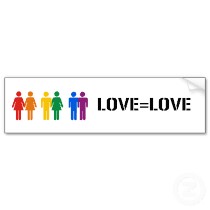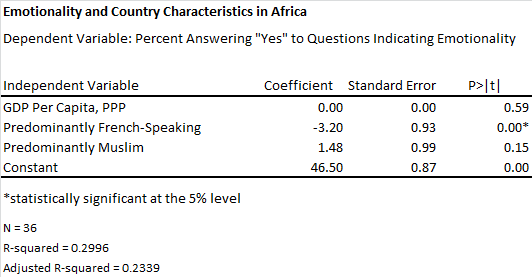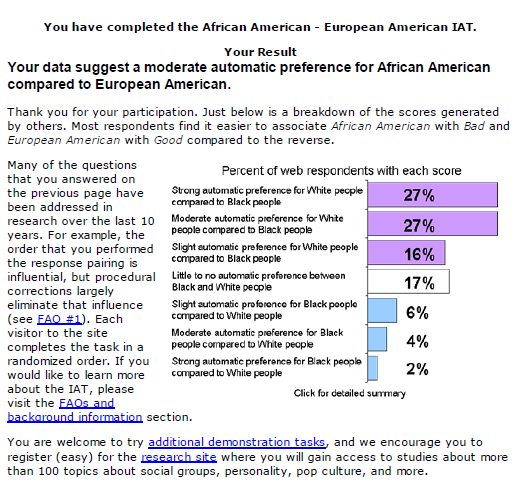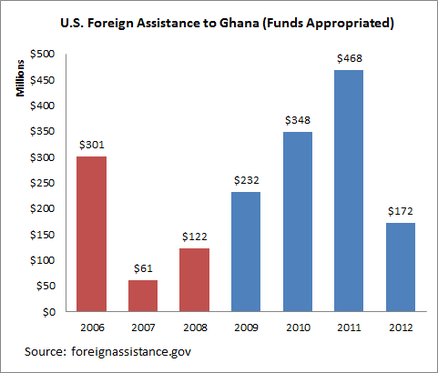|
Gallup recently published results of a global poll on people's propensity to express or report feeling emotions. The Washington Post has a nice color-coded map of the results here. While some regions exhibit trends-- the Americas are bubbly with emotion, while the former Soviet Union is more somber-- Sub-Saharan Africa has a lot of variation. What country characteristics might be associated with increased emotional expression in Africa? I decided to test the relationship between emotionality and wealth as measured by PPP-adjusted GDP per capita, predominant language (a proxy for colonial influence by France or England), and whether at least half the population was Muslim. I used a linear OLS regression; results are below: There was no significant relationship between wealth and emotionality for the African countries. Countries with a Muslim population of at least 50 percent had a slightly higher average emotionality score, but the difference was not statistically significant.
People in Francophone Africa were, on average, 3 percentage points less likely to report expressing or feeling emotion, a result that was statistically significant. This may not sound like much, but it's a whole standard deviation below the mean emotionality score. (The model also explains more than a quarter of variation in African countries' emotionality scores!) So why are the Francophones less effusive? A couple hypotheses: 1. Maybe when translated into French, the survey was less likely to result in positive answers for some reason. 2. The Francophone variable might actually be capturing regional variation, such as lower emotionality in West Africa. 3. The French colonial cultural influence may have included elements of less emotional expression. The first issue is hard to address (language and cultural translation is always an issue when trying to compare social tendencies across cultures.) Putting in regional variables could address the second issue. Another interesting thing to look at would be the impact of political instability. My data, in .dta format for stata, are here: /uploads/1/7/1/1/1711915/africa_emotionality.dta
14 Comments
I took the Implicit Association Test for race at Project Implicit (you can register to participate in online implicit association psychology research.) My results surprised me: I expected to be neutral (don't we all think/hope we are), or if anything, to have a slight preference for European American, given that I am myself a European American.
I wonder if my results are related to the community-oriented culture in West Africa. In Ghana, if you are in trouble, you know people will help you. I would have been unsurprised to find I had implicit associations between African Americans and words like "community", "help", or "friendly", as a result of my experiences with Africans. In more individualist America, I don't trust that bystanders will help if I'm in trouble. But there are positive words I would associate that culture too-- words like "freedom", "privacy", "efficiency" or "merit". I wonder if the words selected for use in the implicit bias test are more likely to be associated with traits I like about Ghanaian culture than the traits I like about American culture. I think the important take away, though, is that it is very easy to make implicit but fallacious generalizations-- in my case, that only European features imply American culture, or that African features only imply Ghanaian culture. Living in another culture certainly challenges your preconceptions-- I remember when Trayvon Martin's death made the news, thinking, "Black people wear hoodies??"-- but it's important to remember that it doesn't make you immune from internalizing new biases.  I was out at dinner in Tamale the other night, and I was surprised to see our server wearing a shirt printed with the slogan "Love = Love". I wondered if he knew what it meant. Most t-shirts purchased in Ghana (and much of Africa) are second-hand, and originate in the U.S. or Europe. The fact that many people are illiterate-- or unfamiliar with American catch-phrases-- can make for some interesting matches between t-shirts and wearers. A friend of mine once saw a very elderly, very traditional man in Kenya sporting a t-shirt with the phrase, "Fuck me, I'm in a Rock Band". I decided to ask the server about it. He admitted that he hadn't understood it when he bought it, but he continued to wear it because it was a good quality shirt, even though he was embarrassed about the slogan. We assured him it was a good shirt and we supported the slogan. In Ghana, homosexual acts are a crime, at least between males. (The law is vague about whether this applies to females as well.) There is no legal protection against discrimination based on sexual orientation, and some politicians have urged people to inform on their neighbors if they suspect they are gay. Those arrested for homosexual acts are often subject to police brutality. (Ghana's laws have not succeeding in completely stamping out the gay community, at least in the most urban areas. I recently tried to attend Gay Night at a bar in Accra with some friends, but we were turned away at the door for not dressing well enough.) Today, four American states (Washington, Minnesota, Maine and Maryland) voted to legalize gay marriage. Wisconsin elected America's first openly gay Senator, Tammy Baldwin. I hope that these outcomes will encourage young people in Ghana to think critically about cultural norms, and to be tolerant of people who fall outside of them. Maybe if America can have a gay Senator, a Ghanaian can consider having a gay neighbor, or even a gay friend. I look forward to talking with my Ghanaian friends and colleagues about these election outcomes, and why they matter to me. (On the downside, although I support decriminalization of marijuana, I'm not looking forward to discussing legalized pot with every wanna-be rasta on Oxford Street...) Among non-American ex-pats, it appears to be a mixed bag. People seem to fall into three camps:
1. Those who care a lot. In the past 12 hours, people in this group have been posting on facebook about how late they stayed up tracking the elections, and congratulating America for a job well done. This group sees who the U.S. President is as important to global policy, including the tone of international discourse. 2. Those who care, but only for America's sake. This group tends to think the entire Republican party is bat-shit crazy. When the elections come up in conversation, they give the Americans sympathetic looks and offer up their home countries as residence options should Romney win. 3. Those who don't really care. This group doesn't really think who the U.S. President is matters much to the world, and doesn't have much interest in talking about the elections. One friend of mine has a blanket policy o Not Ghanaians. Despite the fact that Obama is pretty much universally liked, Ghanaians don't really see themselves as having any real stake in the election. I asked five of my colleagues, all highly educated Ghanaians who could name both presidential contenders, if they cared who won. All five answered, a little hesitantly, "umm...not really." They didn't see any difference in the attention or assistance Africa received with Obama at the helm compared with Bush. What do the numbers say? Here is U.S. foreign assistance appropriations for Ghana from 2006 to 2012: (foreignassistance.gov only gives data back to 2006, and I couldn't get the numbers to match up with Census Bureau data, which go back farther but are less current. If anyone knows how to reconcile the series, I'd love to show data for the whole Bush administration.)
Aid appears to be higher during the Obama administration. (The Census data suggest annual foreign aid of under $100 million a year for the earlier years of the Bush administration.) But wait-- how much of the Obama spending is actually the result of the MCC compact signed under Bush? Although MCC spending isn't trivial-- $457 million for the period-- USAID spending is still much higher, and over half of the MCC appropriations were in 2006. By my reading, Ghana was better off, in terms of simple U.S. dollar aid receipts, under Obama. |
About Liz
I have worked in economic policy and research in Washington, D.C. and Ghana. My husband and I recently moved to Guyana, where I am working for the Ministry of Finance. I like riding motorcycle, outdoor sports, foreign currencies, capybaras, and having opinions. Archives
December 2016
Categories
All
|



 RSS Feed
RSS Feed
